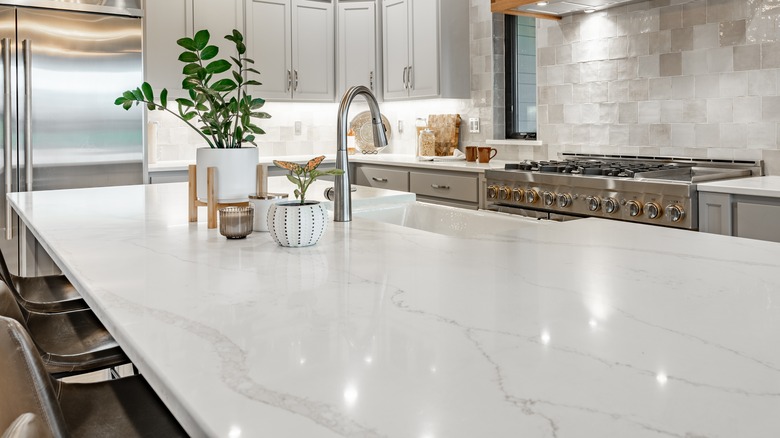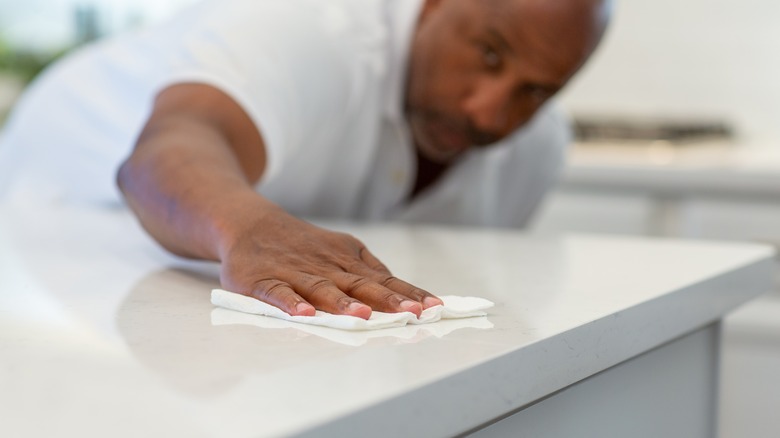The Caramel Hack People Use To Clean Quartz Countertops (But Should You?)
Stone countertops remain popular fixtures in home kitchens, and quartz is no exception. To maintain quality and extend their lifespan, it's important to keep them clean. Sometimes, this can involve knowing what to do when a spill happens before it has the opportunity to damage the stone. One talked-about method for quartz is the caramel hack, but it's not clear whether it's effective enough to warrant buying a bottle or jar of caramel if you have this type of countertop.
While quartz is generally considered stain-resistant due to its non-porous material, accidental spills can still potentially damage these types of countertops. Some blogs claim that caramel may work to remove tough stains from quartz because it purportedly has similar effects to commercial cleaning products, and may even be used as a substitute for Goo Gone. Proponents of this method might suggest that you can apply caramel to stains because the natural stickiness of this confectionary product may potentially lift them without resorting to harsher chemicals or scraping agents. However, there isn't enough scientific evidence to back this method up, and you could potentially create an even stickier problem to contend with. If you happen to have caramel on hand, it may be worth seeing if this product might remove stains and stubborn spills from your quartz countertop, but it's also worth knowing more proven methods of cleaning and stain removal.
Natural options for cleaning quartz countertops
While there's not enough evidence to support caramel as the best way to remove stains from quartz, it's important to know there are other ways to clean this type of stone countertop without having to invest in expensive, and potentially toxic, commercial cleaners. One of the best ways to clean quartz countertops involves going back to the basics: warm water and soap. You can wet a paper towel, soft sponge, or microfiber cloth with warm water and soap, and then gently wipe it along your countertops to get them clean. Follow this up with a dry cloth.
For tougher cleaning jobs, you can also use a vinegar-water solution. Combine equal parts of these ingredients in a spray bottle and apply liberally to your quartz countertops. Wipe the solution off with a paper towel or microfiber cloth and then follow up with clean water. If you need something more abrasive, you can make a paste with baking soda and water. This common pantry item's key ingredient, sodium bicarbonate, is known for its natural abrasive effects while also being gentle, which may be appropriate for occasional use on quartz.
Other ways to maintain quartz countertops
Aside from daily cleanings, there are other ways you can potentially extend the life of your quartz countertops. For one, it's important to clean up spills immediately, particularly those that are acidic or oil-based. These include items such as coffee, lemon juice, and cooking oils. Blot spills with a clean cloth or paper towel immediately to help prevent potential stains and dark spots. You may also use non-bleach containing commercial degreaser products if basic cleaning methods don't work.
It's also important to avoid physical damage to quartz. When cleaning or removing stains, be sure to use soft cloths or sponges, rather than those that are abrasive. Despite quartz's reputation for being durable, it can still sustain damage from scrubbing pads, wire brushes, and other coarse materials. Hot items may also damage quartz. Also, as with any other stone countertop, take care with hefty objects when you're around the kitchen. Dropping heavy boxes, small appliances, and other items on your quartz countertops could inadvertently damage them.


